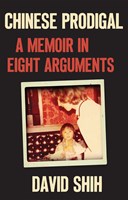Chinese Prodigal: A Memoir in Eight Arguments
August 17, 2023
In his debut memoir, David Shih weaves his personal narrative with the history of a racially divided nation, shining light on the complexity of Asian American identity.
 Chinese Prodigal: A Memoir in Eight Arguments by David Shih, Atlantic Monthly Press
Chinese Prodigal: A Memoir in Eight Arguments by David Shih, Atlantic Monthly Press
I did not pick up the book Chinese Prodigal with any expectation that I would find myself reflected in it—but perhaps there was, as with any book I pick up, an unconscious hope that I might.
As David Shih, author of the book and professor of English at the University of Wisconsin-Eau Claire, writes (emphasis mine):
While we may question the craft or message of a book, outside of sacred texts, we usually do not think to question our relationship to it, or at least not the way we would second-guess ourselves after quarreling with an old friend. But maybe all books are sacred texts because they should be for learning about yourself.
Shih, as an infant, immigrated with his family from Hong Kong to the United States, growing up primarily in Texas. It was there, in 2019, that Shih’s father passed away from diabetes-related complications after a lifetime working as a traveling salesman. In the book’s opening, Shih recounts that he did not make it in time to see his father before his passing, and he looks to understand the internal and external forces that braided together throughout his lifetime, leading to this moment.
The child would start by saying that this country turned him against his parents just by sending him to school. He learned to look upon the parent falsely, as the powerful did. Then he would say how he learned to do the same to himself.
In the eight essays that make up the rest of the book, Shih weaves analyses of history and politics with reflections on his own life. There is a throughline that arises out of these essays about the role of perception in shaping one’s identity. “When you look like me,” Shih writes, “what makes you Asian or not Asian are the words of others, and what makes you Asian American must be your own.”
This is not so much an idea as it is a fact, as Shih argues with evidence from several historic events. He discusses the ever-changing racial categories on the U.S. Census, in which groups of people who were once considered non-White can find themselves recategorized as White in the next census cycle, revealing the arbitrary, movable boundaries of race and ethnicity. Similarly, responding to the Naturalization Act of 1790, which offered citizenship to “free White persons,” immigrants such as Takao Ozawa from Japan and Bhagat Singh Thind from India questioned if they counted as White on the basis of not being Black—the answer handed down by the U.S. Supreme Court in both cases was that they qualified as neither, thus existing in a racially indeterminate space that would later grow into the myth of the model minority.
And in more recent history, there is the racially motivated murder of Vincent Chin in 1982. Residing in Michigan, where anti-Japanese sentiment was high due to the decline in American automobile sales and rise in demand for imports, Chin was targeted by a disgruntled Chrysler foreman and his stepson. “Vincent Chin was Chinese American,” Shih writes, “but Ebens and Nitz needed him to be Japanese to blame him for their anger at Toyota and Datsun, which must have seemed like impudent upstarts too.” The term “Asian American” had been created decades earlier by University of California, Berkeley student activists Yuji Ichioka and Emma Gee, but quickly crystallized after this event.
To be Asian in this country and learn about Vincent Chin was to find out that you were related to someone you’d never met before. […] What Vincent Chin and I had in common as Asian Americans was our vulnerability in America. We were vulnerable to being made into people we were not and were therefore vulnerable to the sanctimony and to the violence that too often followed.
This danger of being turned into someone we are not may lead to violence, as it did in Vincent Chin’s case and as it has in the many anti-Asian hate crimes committed since the start of the COVID-19 pandemic. Yet it appears in insidious everyday encounters, too. Shih describes what it’s like to teach during the first day of a new semester:
Even now, a thrill finds its way up and out of me whenever I lecture in a fluent, unaccented English. I watch how the first, familiar tones and cadences ripple the gentlest wave of relief across the faces of my white students. It’s not unpleasant, this sensation of having one over on someone you’ve never met because of what they think they see.
And while Shih revels in the effects of his unaccented English, he also notes that it can come at the cost of his full identity, as evidenced by an encounter with a fellow professor:
[One] day Bill told me that he didn’t consider me to be Chinese. I must have seemed different to him from his Chinese colleague in the math department, a woman who had immigrated as an adult and whose accent students complained about in their evaluations. There in the stairwell, my voice rebounding off the cinder block walls, I told Bill that I wished he would think about me as Chinese, surprising myself a little, and he never opened up in quite the same way with me again.
I come back to this earlier quote: “Maybe all books are sacred texts because they should be for learning about yourself.” Allow me, then, to deviate for a moment from Shih’s story to my own.
From second grade onward, I was in the gifted and talented program at school, and then in honors and Advanced Placement classes after that. I never felt extraordinary for it—I was a strong reader and writer (and an excellent standardized test taker), so the logical next step was that I’d be placed in more rigorous academic settings. Often, I was the only Mexican American student in my classes, but I didn’t think much of it until I began to hear variations of this phrase directed me: “You sound White.” From my White classmates, it came as a compliment. From my fellow Latine classmates, it was a disparagement. It hurt either way. I didn’t understand what it was that made me “sound White” and not simply like myself.
For a long time, I kept my head down, trying to pass through new environments unnoticed, choosing neither assimilation nor resistance and hoping I could just let my work speak for me instead. But without an unequivocal acceptance and declaration of who we are, we risk being stripped of the intersecting identities that we hold, turned into someone we are not, and distanced from the people who love us most. It is, indeed, surprising when that sentiment finally breaks through the surface, just as Shih experienced in that stairwell, but it can’t be kept down forever.
Shih’s prose, in its beauty, invited me to stay with it, to keep turning the pages. It took me only a few days to read the entire thing. Yet as Shih notes, “Reading a book can be confused with finishing it.” And I’m not sure if I’ll ever truly be finished with this book. I hadn’t expected to see myself reflected in Chinese Prodigal, and now that I have, I feel electrified, wondering where I’m supposed to go from here, knowing that wherever that is, the path won’t be easy.
“Reading a book,” Shih writes, “is not an afternoon under the shade of a tree. It is splitting wood, hard work. Something is at stake for you.”



